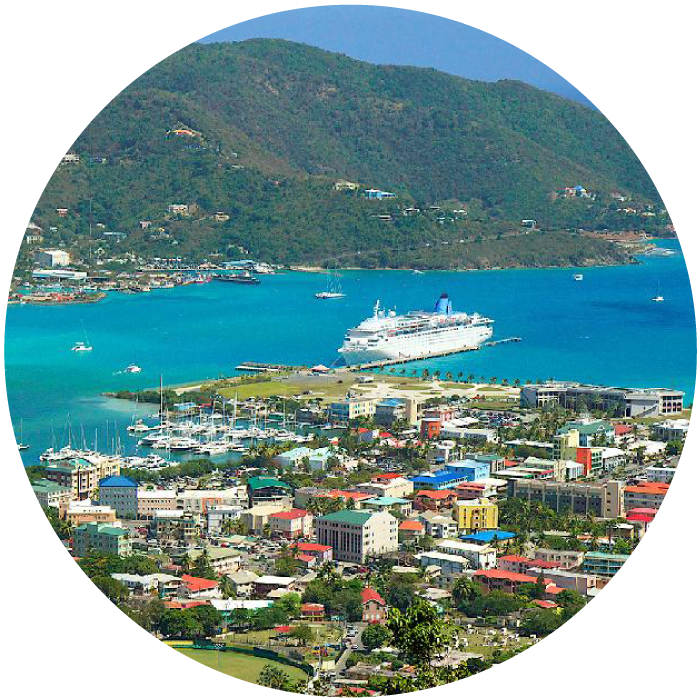1
0% corporate tax
The British Virgin Islands have adopted a zero-rated income tax regime for all corporate entities.
2
The biggest offshore
financial hub
There are over 500,000 foreign businesses incorporated in the BVI.
3
100% foreign
ownership allowed
Any individual or overseas corporate body may incorporate a BVI company.
4
No minimum capitalisation
requirements
There is no minimum paid-capital requirements.
5
No foreign
exchange control
There is no currency control or regulation.

Benefits of incorporation in
the British Virgin Islands
How much would it cost to own a BVI company?
US$1400
For companies that issue less than 50,000 shares
What's included in the package
US$3000
For companies that issue more than 50,000 shares
What's included in the package
What are the documents required?

The Passport of every
shareholder/beneficial
owner and director.

The ID of every shareholder/
beneficial owner and director.

Proof of residential address of every director and shareholder/beneficial owner.
must be in English or a certified
translation to English
What is the incorporation process?
1
Background check
Send your passport copy to our agent. We will run a preliminary background check.

2
Document submission
Log in to our system, upload the documents required and fill in the forms online.

3
Payment
Make payment. We accept major payment method include Cryptocurrencies.

4
Incorporation
Once the application is approved, all soft copies of your company documents will be stored in the platform, hard copies will be couriered to you by air upon request.

5
Open bank account
We partner with a few banks based in Singapore to secure you a corporate account.

Additional services you may need
Bank Account OpeningUS$1400
A BVI company is eligible to open a corporate account in a few selected banks. We know how to do it.
Find Out More
BVI Certificate of IncumbencyUS$200
Certificate of Incumbency is to certify your company shareholder and director details, company is in good standing status and not prevented from opening and operating a bank account overseas. It is an essential document if you plan to open a corporate account.
Annual Renewal Fee
Company authorised to issue up to 50,000 shares US$1400
Company authorised to issue more than 50,000 shares US$3000
As a registered agent, we will keep track and pay the renewal fee in time, so that your company doesn’t get penalised or suspended.
Accounting Services
We help you do the monthly accounting and prepare your financial reports. Plan starts from US$100 per month. Refer to our Accounting services.
Register a Chinese company name US$150
Mailing AddressUS$200 per annum
Need a business address to receive your letters and other documents? We will scan your letters on a daily basis or
redirect mails and documents to your place.
Nominee director/shareholder US$1000
There is no publicly accessible record in the British Virgin Islands. However, you can choose the nominee service to
have an extra layer of protection.
Q&A
What are the British Virgin Islands?
The British Virgin Islands (BVI) is a British overseas territory in the Caribbean. It is the leading offshore financial centre with over 500,000 offshore companies incorporated since 1984. The current population of the British Virgin Islands is approximately 30,000 as of June 2020, based on the latest United Nations estimates. The principal settlement is also its capital, Road Town. The language spoken is English. The official currency of the British Virgin Islands is the US Dollar.
What is the legal and judicial system of the British Virgin Islands?
The statute for company law in the BVI is the Business Companies Act, which follows the British company law principles and concepts in many ways. The BVI courts will apply both English laws and other common law jurisdictions. The Business Companies Act also contains certain concepts such as statutory mergers, segregated portfolio companies and continuations into and out of the BVI, which have no equivalent under English law.
Is the British Virgin Islands tax-free?
Yes. International business companies are exempt from all provisions of the Income Tax Act (including dividends, interest, rents, royalties, compensation and other amounts payable by the company to persons who are not persons resident in the BVI). Capital gains realised on any shares, debt obligations or other securities of a company by persons who are not persons resident in the BVI are also exempt from all provisions of the Income Tax Act. No estate, inheritance, succession or gift tax, rate, duty, levy or other charge is payable by persons who are not resident in the BVI on any shares, debt obligations or other securities of the company, except for interest payable to or for the benefit of an individual resident in the EU. No stamp duty is payable in the BVI on the transfer of shares in a BVI international business company.
What are the circumstances under which a business becomes liable to pay tax?
When the business holds BVI land or carries on business in the BVI, tax may be triggered.
What are the major businesses in the British Virgin Islands?
The significant businesses in BVI are:
- Investment banking and
- Private equity;
- Asset Management;
- Exports and Shipment;
- Trade – electronics, garments and fast-moving consumer goods (FMCG);
- Gold, gems and jewellery; Tourism.
What is the legal framework for the British Virgin Islands’ company operation?
The principal statute governing the formation and operation of BVI business companies is the BVI Business Companies Act (BCA). The statute came into operation on 1 January 2005, replacing the Companies Act of 1985 and the International Business Companies Act, including their respective amendments. All new BVI companies are now incorporated under the BCA. From 1 January 2007, any existing international business companies that were not already re-registered under the BCA were automatically re-registered. The BCA regulates the incorporation and operation of all types of BVI companies, including those limited by shares, those limited by guarantee, unlimited liability companies, restricted purpose companies (also known as special purpose companies or SPVs) and segregated portfolio companies, whether their business is local or international in scope. The most common form of BVI company authorised to issue shares is a limited liability company that intends to carry on business outside the BVI. Business companies proposing to carry on certain types of business (such as insurance or mutual funds) are regulated by additional legislation, the BVI Financial Services Commission and the BVI Registry of Corporate Affairs.
What is the type of business entity that I’ll choose for my British Virgin Islands company?
Under the BVI Business Companies Act 2004, companies incorporated in BVI are defined as a Business Company. Business companies are very popular and widely used by offshore companies because of their ease of administration, flexibility, tax-exempt status and the fact that they are widely accepted and recognised by the international financial community. A business company will be incorporated as a company limited by shares with perpetual existence.
Can the company be set up remotely?
Absolutely, and we know how to do it for you.
Does the British Virgin Islands allow foreign-ownership for companies?
Yes, 100% foreign-ownership is allowed. Any individual or overseas corporate body may incorporate a BVI company.
How long does it take to incorporate the British Virgin Islands company?
The process of incorporation usually takes three workdays.
What is the process of incorporation?
A business company is incorporated by filing the company’s memorandum and articles of association with the Registrar of Corporate Affairs (Registrar), together with a document in the approved form signed by the first registered agent signifying their consent to act in that capacity. There is no requirement to publicise an intention to incorporate, nor is there pre-approval requirement from any BVI regulatory bodies. The registered agent must perform a due diligence review on the promoters of the company.
Once satisfied that all the BCA’s incorporation requirements have been met, the Registrar will register the Memorandum and Articles of Association and issue a Certificate of Incorporation certifying that the company is incorporated on that date. If all appropriate information is provided to the registered agent, filing the memorandum and articles of association with the Registrar to effect incorporation can usually be accomplished within one business day. Issuing a certificate of incorporation usually follows within a couple of days.
What are the conditions or restrictions on establishing a business in specific industry sectors? Are there industry sectors in which it is not permitted to establish a business?
The following are subject to additional licensing requirements under the British Virgin Islands law:
Any company proposing to act as:
- a bank or deposit-taking institution;
- a money service business;
- an insurer;
- a corporate service provider; or
- a corporate trustee. Certain types of investment funds.
- Any company proposing to conduct investment business in or from the BVI.
Are there requirements for my company name?
The name of a limited by shares company shall end with:
(a) the word “Limited” “Corporation” or “Incorporated”;
(b) the words “Societe Anonyme” or “Sociedad Anonima”;
(c) the abbreviation “Ltd”, “Corp”, “Inc” or “S.A.”.
Company names containing words like “Bank”, “Trust”, “Insurance”, “Fund” or words conveying a similar meaning, and names suggesting royal or governmental patronage cannot be used except with written approval from the Registrar and regulatory licencing, as applicable. The Registrar will not accept company names that are objectionable or are identical to, or closely resemble, the names of existing BVI companies, or well-known international names, unless the existing company gives its consent.
Can I change my company name?
A company may make an application to the Registrar in the approved form to change its name.
What is the minimum capital needed to incorporate a company in the British Virgin Islands?
There are no requirements or minimum for the paid-up capital of the BVI offshore company, however for a normal authorised capital of USD 50,000, it is divided into shares that can be with or without par value.
Are grants or tax incentives available for companies establishing a business?
Certain grants and/or incentives may be available for companies establishing a business in the BVI. Historically, these grants have been given to capital-intensive projects that will lead to local employment opportunities, for example, hotel construction. These grants/incentives must be negotiated with the BVI Government and are typically implemented through private legislation.
Is foreign tax relief applicable to the British Virgin Islands registered companies?
No, this is not applicable as there are no double tax arrangements, moreover there is no taxation on income in the BVI.
Are there any foreign currency regulations?
There are no foreign exchange controls or foreign exchange regulations under BVI law.
What is the tax position when profits are remitted abroad?
There is no withholding tax in relation to BVI companies.
Are there restrictions on the transfer of shares in private companies?
Subject to any limitations or provisions to the contrary in the company’s memorandum or articles, any unissued shares and treasury shares are at the disposal of the directors. They can, without limiting or affecting any rights previously conferred on the holders of any existing shares or class or series of shares, offer, allot or otherwise dispose of shares to any persons, at times and on terms determined by them.
Should I set up a fully operational office in the British Virgin Islands?
No. The only mandatory legal requirement is to have a “minimum local presence”, which means having a Registered Office and a Registered Agent in the BVI. We can provide this service for you. We also have mail and fax forwarding, document re-mailing and call handling services.
Are there restrictions on foreign ownership or occupation of real estate, or foreign guarantees or security for ownership or occupation?
In general, companies cannot own land in the BVI (or take security over land in the BVI), except under short term leases, without obtaining certain BVI landholding licences. To own real estate in the BVI, it is a pre-requisite that “Non-Belongers” and “Non-Belonger Companies” obtain a “Non-Belonger Land Holding Licence” (NBLH Licence). Similarly, no interest in land in the BVI, including a charge, can be acquired by any party who does not belong to the BVI unless that party holds an NBLH Licence.
Are there any requirements to employ local workforce for the British Virgin Islands companies?
No, there are no obligations for employment of local workforce.
What are the main laws regulating employment relationships?
The Labour Code 2010 is the main law regulating employment relationships. It sets out minimum requirements for annual vacation, maternity leave, notice periods and redundancy. The code applies to all employees (whether “Belongers” or “Non-Belongers”) employed in the BVI.
What prior approvals (for example, work permits, visas, and/or residency permits) do foreign nationals require to work in the British Virgin Islands?
Foreign nationals need a work permit issued by the Department of Immigration before entering into the territory to work.
Do I need a local shareholder or director for my British Virgin Islands company?
No local shareholders and directors are required to form and manage the company.
How many shareholders do I need in my British Virgin Islands company?
A minimum of one shareholder is required. There is no restriction on the nationality of the shareholder, and it can be another corporation. No details of the shareholders will appear on the public file in the BVI, but a register of shareholders must be kept at the registered office address of the company in the BVI.
What are the requirements for the director of my British Virgin Islands company?
A minimum of one director is required. There is no maximum. Corporate directors are permitted.
Individual directors must:
- Be over the age of 18 years.
- Not be disqualified or restricted within the meaning of the BVI Insolvency Act.
- Not be an undischarged bankrupt.
- Not otherwise be disqualified by the memorandum and articles of association.
Does the British Virgin Islands company need to file Register of Directors?
A Register of Directors must be kept at the BVI registered office. There is no need to file the Register of Directors with the Registrar.
Are there any restrictions on the minimum and maximum number of members?
There are no restrictions on the minimum and maximum number of members.
When should I arrange for the annual renewal of the British Virgin Islands company after it is incorporated?
If your BVI company is incorporated in or before June, it should be renewed before May 31 each year to ensure its legal status and recognition. Whereas BVI company incorporated from July to December can be renewed before November 30 each year.
What is the company renewal fee?
For BVI Company, the annual fee payable to maintain a standard company authorised to issue up to 50,000 shares is USD 450, and annual fee for a company authorised to issue more than 50,000 shares is USD 1,200.
What is penalty fee If I fail to pay the renewal fee on time?
For BVI Companies incorporated between January 1st to June 30th renewal fees should be paid to the Registry before May 31’s deadline to avoid the penalties:
- June 1 to July 31st – 10% of renewal fee.
- August 1 to October 31 – 50% of renewal fee.
- November 1 to January 31 – 50% of renewal fee plus
- Restoration fee of USD 825.
- From February 1 – Penalty is the Restoration fee of USD 1125.
- December 1 to January 31 – 10% of renewal fee.
- February 1 to April 31 – 50% of renewal fee.
- May 1 to July 31 – 50% of renewal fee plus Restoration fee of USD 825.
- From August 1 – Penalty is the Restoration fee of USD 1125.
Is there any audit required for company renewal?
No. The main requirement is to pay the renewal fee on time.
What financial reports must the company submit each year?
There is no requirement to file accounts or a financial statement. A business company must keep accounts and records that are sufficient to show and explain the company’s financial transactions and will, at any time, enable the financial position of the company to be determined with reasonable accuracy. A business company must also keep minutes of all meetings and copies of all resolutions passed by the directors, members and officers.
Does the company have to maintain books and records in the British Virgin Islands?
Under the Mutual Legal Assistance (Tax Matters) Act 2003 (as amended), every company must keep its accounts, records and underlying documentation at the office of its registered agent or at another place determined by the directors. The records must be sufficient to show and explain the company’s transactions and must enable the financial position of the company to be determined with reasonable accuracy. These records must be kept for at least five years from the date of completion of the transaction in question, or the date when the company terminates the business relationship to which the records relate. If the records are kept somewhere other than the office of the registered agent, the company must provide the registered agent with a written record of the physical address of the records.
What information about a company would be disclosed via the BVI Registrar of Businesses?
For all registered BVI companies, some of the information would be disclosed to the public via the BVI Registrar of Businesses and depending on the situation; the court may access other information through the customers’ BVI registered agent. The disclosed information generally includes the company’s registered office, registration number, company status, date of incorporation, and authorised capital. Furthermore, the public record of a BVI registered company also contains the following information:
- Company Incorporation Certificate – a one-page certificate issued by the BVI government that confirms the client’s company is registered correctly.
- A Certificate of Good Standing (CGS) is an official document, issued by the Registrar of Companies, confirming that a particular company legally exists, has complied with all administrative requirements pertaining to its continued registration and has paid all government dues, and, therefore, is “in good standing” in the Companies Register as of the given date. In its form, the CGS largely resembles the initial Certificate of Incorporation of the company. The CGS is used to formally confirm the continued legal existence of an offshore company after some time has already passed since it´s registration.
- Memorandum of Association and Articles of Association – Details of the company beneficial owners, directors and shareholders are not publicly available – the only documents held on public record are the memorandum and articles of association, and normally they do not contain any indication as to the actual shareholders, directors or the beneficial owners of the company.
Can I get a gambling license for my British Virgin Islands company?
No. BVI is not a suitable jurisdiction for any online or offline gambling business.
Can I register a mutual fund or investment fund in the British Virgin Islands?
Yes, certainly. The BVI is one of the most popular offshore jurisdictions for offshore mutual fund registration, which is regulated and licensed under the Securities and Investment Business Act, 2010, as well as several regulations and guides under the law.
Can I open a bank account for my British Virgin Islands company in Singapore?
Yes, we can open a bank account here in Singapore for your BVI company.
Get an expertto answer your question

